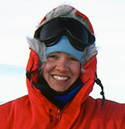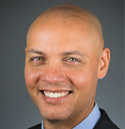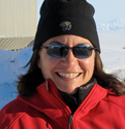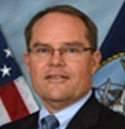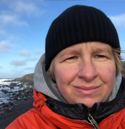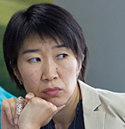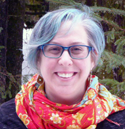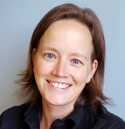Polar Sub-Committee on Diversity and Inclusion Bios
Dr. Ginny Catania is a Professor in the Department of Geological Sciences and a Senior Scientist at the Institute for Geophysics at the University of Texas. Catania's research centers on understanding the physics that govern ice sheets at their boundaries, primarily the ice-ocean and ice-bed interface. She has led over a dozen expeditions to Greenland and Antarctica to study these inaccessible parts of the ice sheets, and her efforts have resulted in over 60 peer-reviewed publications. Her research approach relies heavily on the use of observational data from both in-situ and remotely-sensed data. Catania also dedicates her time to improving the PhD program at the University of Texas by supporting students with a combination of mentorship and professional development. Catania received her PhD in Geophysics from the University of Washington and her MS in Geology from the University of Minnesota. She hails from Canada and sometimes wonders how she ended up in a state with no glaciers at all.
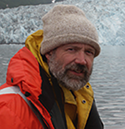
is an Arctic anthropologist and Director of the Smithsonian Institution's Arctic Studies Center in Anchorage. His research and publications in anthropology and archaeology focus on cultural ecology, coastal adaptations, paleoenvironments, Indigenous knowledge, and colonial history. He has curated major Smithsonian exhibitions in collaboration with Indigenous communities of the North including
Crossroads of Continents: Cultures of Siberia and Alaska; Looking Both Ways: Heritage and Identity of the Alutiiq People; and the current
Living Our Cultures, Sharing Our Heritage: The First Peoples of Alaska. Crowell leads museum and community-based programs in Alaska Native heritage, languages, and arts and he is currently Principal Investigator for an NSF-funded study of the human and environmental history of Yakutat Bay in southeast Alaska. Crowell's Ph.D. in Anthropology is from the University of California, Berkeley and he teaches as an Affiliate Professor of Anthropology at the University of Alaska, Anchorage.
Ms. Raychelle Aluaq Daniel is Yup'ik, from Tuntutuliak, Alaska, located at the confluence of the Kuskokwim River and Bering Sea. She is currently with The Pew Charitable Trusts U.S. Arctic Program. She collaborates with Indigenous Peoples and communities on advancing policy and research priorities important for living an Indigenous way of life. Some of these issues include: bridging Indigenous Knowledge and science in decision-making, advancing the co-production of knowledge, identifying policy priorities from an Indigenous perspective and addressing the impacts from anthropogenic marine activities such as fisheries and Arctic shipping. She has experience working with federal and state governments as well as with academia.
Dr. Ryan E. Emanuel is an associate professor in the Department of Forestry and Environmental Resources and a Faculty Fellow in the Center for Geospatial Analytics at North Carolina State University, where he has been recognized as an Alumni Distinguished Graduate Professor and University Faculty Scholar. Emanuel is an interdisciplinary environmental scientist with expertise in hydrology and ecology. His work includes numerical modeling, remote sensing, and fieldwork to understand how vegetation and terrain affect hydrological and biogeochemical processes in natural and human-altered landscapes. He has led research efforts in the southeastern US, in the Rocky Mountains, and elsewhere. Emanuel is an enrolled citizen of the Lumbee Tribe of North Carolina, and he also works to illuminate impacts of environmental change on Indigenous communities and to identify barriers and solutions to Indigenous participation in environmental governance.
Emanuel has received awards for service to Indigenous communities from the American Indian Science and Engineering Society and from the United Tribes of North Carolina. He is the recipient of North Carolina State University's annual sustainability award and the North Carolina Environmental Justice Network's annual award for academic research.
Emanuel advises the North Carolina Commission of Indian Affairs on environmental justice policy, and he has held positions on local and statewide advisory boards for American Indian education. He serves on the academic advisory council of the American Indian Science and Engineering Society and on the diversity and inclusion advisory committee of the American Geophysical Union. He formerly served on the education and outreach committee of CUAHSI, the Consortium of Universities for the Advancement of Hydrologic Science, Inc. Emanuel holds a Ph.D. and M.S. in Environmental Sciences from the University of Virginia and a B.S. in Geology from Duke University.
Dr. Linda Bailey Hayden leads the Workforce Development work area for the NSF Science Gateway Community Institute. She has developed and implemented student Hackathon events for SGCI during the XSEDE PEARC conferences and during Supercomputing conferences. She received the Presidential Award from the National Science Foundation in 2003 for Excellence in Science, Mathematics and Engineering Mentoring (PAESMEM).
She directs the High School and Undergraduate Student Outreach program for IEEE-Geoscience and Remote Sensing Society engaging hundreds of students worldwide in remote sensing training. Dr. Hayden also directed the education and outreach efforts of the NSF Center for Remote Sensing of Ice Sheets. During that time, she orchestrated the participation of hundreds of students in Polar Science Research with 42-63% being women and 66-89% being underrepresented on an annual basis.
Dr. Hayden was on the research team acknowledged by the international polar science community with the naming of a small, previously unnamed Antarctic bay after the Elizabeth City State University. The name Elizabeth City State University Bay has been approved for use on maps and other products of the Federal government. The Advisory Committee on Antarctic Names (ACAN) recommended Elizabeth City State University Bay for approval at its meeting on January 5, 2012 to the U.S. Board on Geographic Names. The name Elizabeth City State University Bay considered by the Board at its meeting on April 17, 2012, and as indicated was approved.
Dr. Gretchen Hofmann is a marine biologist whose research focuses on the responses of marine species to future ocean change such as ocean acidification and ocean warming. Working in places as diverse as the coastal oceans of California and Antarctic waters, Dr. Hofmann and her lab group are trying to understand whether and how marine species can adapt to future changes in the ocean Studies in the lab focus on how organisms work in the face of these changes, whether species have the physiological flexibility to respond to future oceans and whether adaption is possible.
Dr. Hofmann and her lab personnel are involved in research on ocean acidification - the gradual reduction in ocean pH by the seawater's uptake of atmospheric CO2. Recent government reports project ocean acidification to increase over the next century and have significant impacts on shell-forming organisms as they build and maintain their hard structures. However the overall physiological response that organisms will have under these "acidified" seawater conditions is still being determined. Studies by Dr. Hofmann and her collaborators are identifying key challenges for marine animals such as sensitive larval stages of marine species in acidified waters. She is also investigating the combined effects of temperature and acidity, in order to better understand how marine species will cope with the dual challenges of global warming and ocean acidification in the coming century. A major project in the Hofmann lab, funded both by funding from the UC and the U.S. National Science Foundation, is to understand the ocean acidification seascape on the coast of California and to predict the responses of ecologically and economically key species. This project involves the establishment of a pH sensor network at sites in coastal California and the "co-location" of these sensors with biological measurements. The research is revealing that patterns of natural variation may create refuges from future ocean acidification, something that is of great interest to managers in California that work within the NOAA Channel Islands Marine Sanctuary and the Channel Islands National Park. In addition, Dr. Hofmann and her lab group have an ongoing study on the impacts of ocean acidification on marine organisms from coastal regions of the Southern Ocean in Antarctica. Funded by the U.S. National Science Foundation, this project links oceanographic measurements of pH to the physiology of organisms that live in these subzero waters.
Dr. Hofmann is committed to communicating her science to broad audiences and sharing her research results with groups that make decisions about ocean change in California. In support of this philosophy of "knowledge to action", she is a member of California's Ocean Protection Council's recently formed Ocean Acidification and Hypoxia Science Panel. She has served as a U.S. delegate to the IPCC Workshop on Ocean Acidification in Okinawa Japan. Dr. Hofmann contributed to the National Research Council's recent report and recommendations on ocean acidification policy and she is a Lead Author on Chapter 24, Oceans and Marine Resources, in the Third National Climate Assessment. Finally, Dr. Hofmann is an Aldo Leopold Fellow (2009) and works to communicate her science to the public, policymakers and students.
Steve Iselin is from Racine Wisconsin and is a diehard Cheesehead. He obtained a B.S. in Civil Engineering and was commissioned an Ensign in the U.S. Navy Civil Engineer Corps in May 1980. He served 20 years Active Duty in positions of increasing responsibility. From 2000-2002 Steve led the Plexus Scientific Corp. facilities consulting practice, supporting NASA and The Smithsonian. From 2002-2018 Steve served as a Navy civil servant, holding positions including Executive Director (2007-2014) at the Naval Facilities Engineering Command, and Principal Deputy Assistant Secretary of the Navy for Energy, Installations & Environment (2014-2018). In 2018 Steve and his wife relocated to Eden Prairie, MN to work on their grandparenting skills. From 2010-2013 Steve helped establish and served as the 1st Board Chair for the National Capital Area Chapter of the American Foundation for Suicide Prevention.
An early-career scientist,
Dr. Amanda Kelley's research program encompasses understanding organism-environment interactions in the context of ocean change. Dr. Kelley is keenly interested in characterizing environmental sensitivities and thresholds that exist for high-latitude coastal ecosystems in response to a changing environment. The focus of this work is two-fold. Her research is concerned with understanding the drivers of nearshore carbonate chemistry variability in high-latitudes using
in situ autonomous mooring arrays including pH, temperature, salinity, oxygen concentration, all factors associated with ocean change. These data are used to frame manipulative laboratory experiments aimed at determining the physiological thresholds of coastal species to ocean change, which brings a measure of ecological relevance to the results. Since arriving at UAF, Dr. Kelley's focus, in large part, has been to study impacts of future climate change (ocean acidification, ocean warming, etc.) on species that are important to Alaska Native communities as subsistence resources, particularly in the context of food and cultural security. As a person of Native American ancestry (Te-Moak Tribe of Western Shoshone), she understands the importance of producing science that is culturally relevant and engages groups that have a cultural and subsistence interests that rely on the wellbeing of natural marine resources.
Dr. Vera Kuklina is a Research Professor at the Geography Department, George Washington University. She received her PhD (kandidatskaya) in social, economic, political and recreational geography from the V.B. Sochava Institute of Geography of the Siberian Branch of Russian Academy of Sciences in 2003. Vera was born and raised in a remote Buryat village, and has extensive experience of the field studies with indigenous people and other remote communities. Her research interests include urbanization of indigenous people, traditional land use, socio-ecological systems, cultural geographies of infrastructure and remoteness. The results have been published in
Polar Geography, Geoforum, Sibirica, and numerous Russian journals. Dr. Kuklina currently leads a project, entitled "Informal Roads: The Impact of Unofficial Transportation Routes on Remote Arctic Communities." This project is aimed at detailed interdisciplinary analysis of the overall impact of informal roads on Arctic environment and economic, social, and cultural wellbeing of local communities.
Dr. Anne-Marie Núñez (she/her/ella) is Professor of Higher Education and Student Affairs in the Department of Educational Studies at The Ohio State University. Before joining Ohio State, Dr. Núñez served nine years as a faculty member at the University of Texas San Antonio (UTSA), the second largest HSI on the U.S. mainland. Her award-winning research examines how to promote equitable postsecondary educational opportunities for historically underserved groups in higher education. Among her over 70 publications, she co-edited
Hispanic-Serving Institutions: Advancing Research and Transformative Practice (2015), an International Latino Book Award winner that was the first book to focus on the role of Hispanic-Serving Institutions (HSIs) in the American higher education system. She served as a co-author, committee member, and presenter of the 2019 National Academy of Sciences, Engineering, and Medicine (NASEM) report
Minority-Serving Institutions: America's Underutilized Resource for Strengthening the STEM Workforce. Her article "Applying an Intersectionality Lens to Expand Equity in Geosciences" is currently the second most read article in the
Journal of Geoscience Education. She has presented about diversity and equity issues at the American Geophysical Union, Geological Society of America, and Paleontological Research Institution. Her current research to advance equity in STEM focuses on building capacity in Hispanic-Serving Institutions (HSIs) to raise Latinx attainment in geoscience and computing fields, and is funded by over $10 million in grants from the National Science Foundation.
Julie Raymond-Yakoubian is the Social Science Program Director for Kawerak, Inc. Kawerak is the Alaska Native non-profit Tribal consortium for the 20 federally recognized Tribes of the Bering Strait region of Alaska. Julie has been living and working in Alaska for over 20 years and working in the Bering Strait region for over 13 years. Her current collaborations with Tribes focuses on topics such as the connections between subsistence and identity, the cultural importance and meaning of non-ordinary experiences and knowledge, climate change and mental health, a variety of Traditional Knowledge documentation and Knowledge application projects, and work on Tribal research sovereignty - including protocols, guidelines, and toolkits related to research. Julie has a PhD and M.A. in Anthropology as well as an M.A. in Northern Studies from the University of Alaska Fairbanks.
https://kawerak.org/natural-resources/social-science/.

Dr. Herbert Schroeder is the Chair of The Alaska Native Science & Engineering Program (ANSEP) which was started in 1995 with a single student as a recruitment and retention effort for Alaska Native students interested in careers in engineering. Through the years and with the assistance of hundreds of partner organizations, ANSEP has developed into a sequential model that begins working with kindergarten students, on through middle and high school, into the undergraduate years, to graduate school and into the professions. There are now thousands of students engaged in the Kindergarten to PhD pipeline. They are going from eighth grade to a STEM BS degree in five years and moving on to the top graduate schools in the nation. In 2015, the Urban Institute found that ANSEP students perform above national averages for all students at every educational level. Partner organizations have provided more than $90 million to support this effort. Dr. Schroeder has received the following recognitions for his work:
- 2004 Presidential Award for Excellence in Science, Mathematics, and Engineering Mentoring, with President George W. Bush, in the White House Oval Office, May 16, 2005. Administered by the National Science Foundation for the Executive Office of the President of the United States, Office of Science and Technology Policy.
- 2005 Alaska Federation of Natives Denali Award, the greatest honor presented by the Federation to a non-Native.
- With funds provided by partner organizations, the 13,000 square foot canoe shaped ANSEP Building was opened in 2006 on the University of Alaska Anchorage campus to provide a focal point for ANSEP.
- 2009 National Action Council for Minorities in Engineering (NACME), Reginald H. Jones Distinguished Service Award (Founders Award) created to honor individuals whose efforts and accomplishments have resulted in increased underrepresented minority participation in the nationâs engineering workforce.
- In 2009 the Dr. Herb Illisaurri Schroeder Chair of ANSEP was created at UAA with an endowment provided by ANSEP partner organizations.
- The 2018 University of Colorado Boulder, George Norlin Award which recognizes outstanding alumni who have demonstrated a commitment to excellence in their chosen field of endeavor and a devotion to the betterment of society and their community.
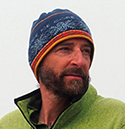
is professor in Earth and Space Sciences, adjunct professor in Atmospheric Sciences, director of IsoLab at the University of Washington. Steig studies the glaciology and climate of polar and alpine regions. His primary focus is the development of paleoclimate records from ice cores, and their application to understanding of Antarctic climate variability and the relationship between climate and ice-sheet dynamics. He is a former Director of the Quaternary Research Center, member of the board of reviewing editors for the journal Science, and steering committee member of International Partnerships in Ice Coring Science (IPICS) and the West Antarctic Ice Sheet Initiative. He is a current member of the U.S. Ice Core Working Group.
Dr. Anne Todgham is an Associate Professor in the Department of Animal Science at the University of California Davis. Anne is an animal physiologist with an interest in understanding the strategies animals use to cope with environmental change. Currently her research program has an eye towards global climate change and addresses the general question of whether aquatic animals have the physiological flexibility necessary to withstand the unprecedented rates of environmental change. She is particularly interested in how organisms respond to multiple stressors that are predicted to change simultaneously, such as temperature, hypoxia, salinity and ocean acidity. She, her students and her postdocs are trying to understand how well these animals are at multi-tasking the various energetic demands placed by different stressors.
Anne studies a wide variety of organisms from estuarine as well as temperate and polar marine ecosystems. In the Antarctic, her team is investigating the capacity of early life stages of Antarctic fishes to tolerate projected changes in temperature and CO2 levels and the energetic costs associated with responding to these changes. When not studying Antarctic fishes, her research program looks at how intertidal animals cope with unpredictable environmental variation, the conservation physiology of native California species and managing stress in sustainable aquaculture. Anne earned her B.Sc. in Marine Biology at the University of Guelph, Canada and her Ph.D. in Zoology from the University of British Columbia, Canada. She first came down to the Antarctic as a postdoc in 2006 and has been hooked ever since!
Dr. Marta E. Torres is a Professor of Oceanography at Oregon State University. For what is now almost four decades, she has been applying state-of-the-art inorganic elemental and isotopic measurements toward understanding geochemical changes associated with carbon cycling and fluid transport along ocean boundaries. She has pursued investigations using a variety of tools, including conventional vessels and icebreakers, deep-sea drilling platforms, and remotely operated/deep submergence vehicles towards understanding the impact of early diagenesis and fluid flow on elemental mass balances, mineral and microbially mediated reactions and earthquake generation at convergent margins. While her studies have targeted most ocean basins, at high latitudes she has conducted research in the north slope of Alaska, offshore Svalbard, the Nares Strait and Chucki Sea in the north, and the Bransfield Strait, South Georgia and the Scotia Sea in the south.
